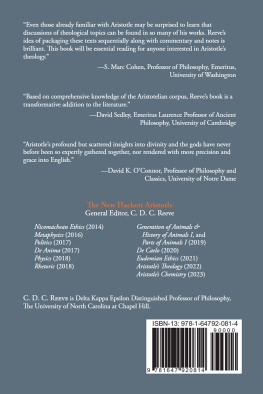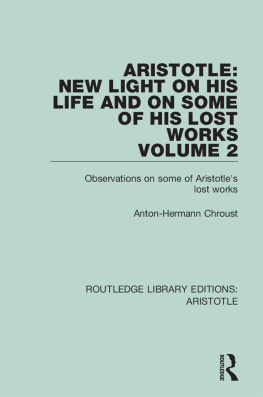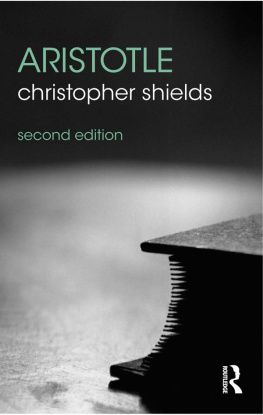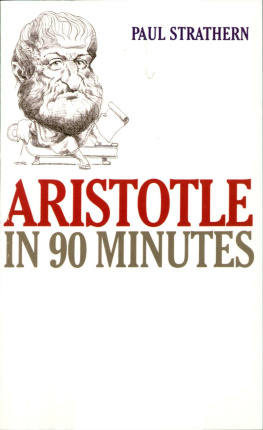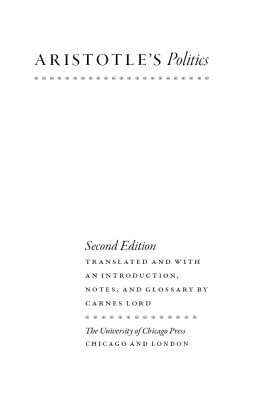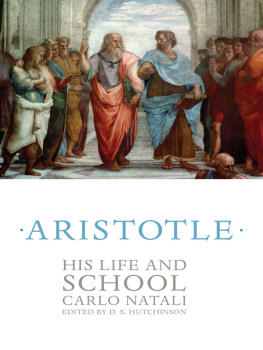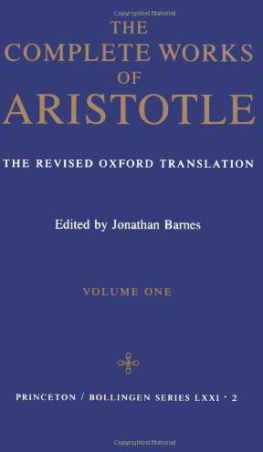ROUTLEDGE LIBRARY EDITIONS: ARISTOTLE
Volume 1
ARISTOTLE: NEW LIGHT ON HIS LIFE AND ON SOME OF HIS LOST WORKS VOLUME 1
ARISTOTLE: NEW LIGHT ON HIS LIFE AND ON SOME OF HIS LOST WORKS VOLUME 1
Some novel interpretations of the man and his life
ANTON-HERMANN CHROUST

First published in 1973
This edition first published in 2016
by Routledge
2 Park Square, Milton Park, Abingdon, Oxon OX14 4RN
and by Routledge
711 Third Avenue, New York, NY 10017
Routledge is an imprint of the Taylor & Francis Group, an informa business
1973 Anton-Hermann Chroust
All rights reserved. No part of this book may be reprinted or reproduced or utilised in any form or by any electronic, mechanical, or other means, now known or hereafter invented, including photocopying and recording, or in any information storage or retrieval system, without permission in writing from the publishers.
Trademark notice : Product or corporate names may be trademarks or registered trademarks, and are used only for identification and explanation without intent to infringe.
British Library Cataloguing in Publication Data
A catalogue record for this book is available from the British Library
ISBN: 978-1-138-92762-9 (Set)
ISBN: 978-1-315-67490-2 (Set) (ebk)
ISBN: 978-1-138-93706-2 (Volume 1) (hbk)
ISBN: 978-1-315-67494-0 (Volume 1) (ebk)
Publishers Note
The publisher has gone to great lengths to ensure the quality of this reprint but points out that some imperfections in the original copies may be apparent.
Disclaimer
The publisher has made every effort to trace copyright holders and would welcome correspondence from those they have been unable to trace.
ARISTOTLE
New light on his life and on some of his lost works
Volume I
Some novel interpretations of the man and his life
Anton-Hermann Chroust

First published in 1973
by Routledge & Kegan Paul Ltd,
Broadway House, 68-74 Carter Lane,
London EC4V 5EL
Printed in Great Britain by
Richard Clay (The Chaucer Press) Ltd, Bungay, Suffolk
Copyright Anton-Hermann Chroust 1973
No part of this book may be reproduced in any form without permission from the publisher, except for the quotation of brief passages in criticism
ISBN 0 7100 7582 0
To the Memory of Roscoe Pound Teacher, Friend, Scholar
Contents
Volume I
Some novel interpretations of the man and his life
Volume II
Observations on some of Aristotles lost works
Abbreviations |
Introduction |
I | The Probable Dates of Some of Aristotles Lost Works |
II | A Note on Some of the Minor Lost Works of Aristotle |
III | Aristotles First Literary Effort: The GryllusA Work on the Nature of Rhetoric |
IV | Eudemus or On the Soul: An Aristotelian Dialogue on the Immortality of the Soul |
V | The Psychology in Aristotles Eudemus or On the Soul |
VI | Aristotles On Justice |
VII | A Brief Account of the Reconstruction of Aristotles Protrepticus |
VIII | An Emendation to Fragment 13 (Walzer, Ross) of Aristotles Protrepticus |
IX | What Prompted Aristotle to Address the Protrepticus to Themison of Cyprus? |
X | The Term Philosopher and the Panegyric Analogy in Aristotles Protrepticus |
XI | Aristotles Politicus |
XII | The Probable Date of Aristotles On Philosophy |
XIII | A Cosmological (Teleological) Proof for the Existence of God in Aristotles On Philosophy |
XIV | The Concept of God in Aristotles On Philosophy (Cicero, De Natura Deorum I. 13. 33) |
XV | The Doctrine of the Soul in Aristotles On Philosophy |
XVI | Aristotles On Philosophy and the Philosophies of the East |
XVII | Aristotles Criticism of Platos Philosopher King: Some Comments to Aristotles On Kingship |
Conclusion |
Postscript Werner Jaeger and the Reconstruction of Aristotles Lost Works |
Notes |
Index of Ancient Authors |
Index of Modern Authors |
This book, which consists of two distinct volumes, essentially is a collection of papers which I wrote between 1963 and 1968, when I became interested in the historical Aristotlethe Aristotle revealed not merely in the highly problematic Corpus Aristotelicum , but also in the ancient biographical tradition and in the lost works of the young Stagirite. Some of the papers collected and edited here owe their origin to classroom discussions and lectures which I offered while on leave from the Notre Dame Law School. They have previously been published in various journals, both in the United States and elsewhere. When re-editing these papers for this book, I made some far-reaching alterations, important additions, incisive corrections and, it is hoped, some worthwhile improvements.
But let the reader beware. This book, which is neither pro-Aristotelian nor anti-Aristotelian, reflects a predominantly historical attitude towards Aristotle and the essentially enigmatic Aristotelian problem. Such an attitude might make it rather unpopular in certain quarters which, for reasons known only to the initiated, insist on the timeless impersonality and absolute philosophic sovereignty of Aristotelian philosophy. The historical approach, which is opposed to all forms of emotional idolatry and uncritical dogmatism, however, should not make this book completely useless to those who for reasons of their own prefer Aristotelianismwhatever that meansto Aristotle himself. Without an adequate grasp of Aristotle as a concrete historical phenomenon we may never gain an adequate understanding of his true position and concrete significance within the intellectual history of Western mankind. The particular human condition, being what it is, always was, and probably always will be, simply demands that mans deeds, from the most insignificant performance to the most exalted achievement, take place in a time continuum and, hence, in history. Timelessness and a-historicity always result in the deplorable loss of personality and individuality, and concomitantly, in the loss of real meaning. Dogmatic fervor, aside from impeding or retarding real scholarship, can never become an adequate substitute for historical facts.
Modern Aristotelian scholarship, which undoubtedly begins with Werner Jaeger, has brought about the realization that a more satisfactory and more adequate insight into Aristotle the philosopher requires a better understanding of Aristotle the man. Hence, we must know more about the historical personality called Aristotle and about the salient circumstances or events of his life. No attempt is made here, however, to write a coherent and exhaustive biography of the Stagirite. I limit myself to the scrutiny and discussion of several traditional biographies of Aristotle. Within the confines of these I further restrict myself to some significant incidents in his life and to certain characteristic traits of the man. Many of my discussions consist of educated guesses and what appear to be reasonable conjectures or hypotheses intended to stimulate further investigations, rather than to offer definite or final answers. In brief, aside from attempting to supply some tentative answers, this book is also a deliberate search for additional suggestions, informed challenges and scholarly disagreements. Only in the dispassionate confrontation of conflicting scholarly views may we ever hope to obtain true insights into the significant incidents in the ntellectual history of mankind.
Next page

